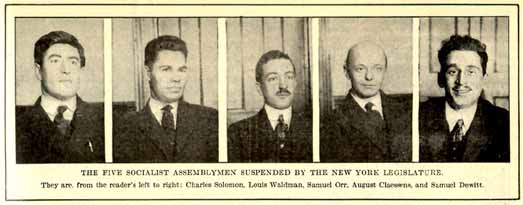The extent to which liberal democracy tolerates those with views regarded as inimical to liberal democracy is an issue ever with us.
One argument goes along the lines “The freedom of all is greater than the freedom of one”. Another goes goes along the lines “Democracy must protect form as well as substance and avoid the tyranny of the majority”.
On 7 January 1920, the 143rd New York State Legislature convened. The Assembly’s majority Republicans elected their candidate for Speaker, Thaddeus C Sweet.
After formalities, Sweet directed the Sergeant-at-Arms to present before the bar of the House the Assembly’s five Socialist members. He stated that they had “elected on a platform that is absolutely inimical to the best interests of the state of New York and the United States” and for a party which was “not truly a political party” but “a membership organization admitting within its ranks aliens, enemy aliens, and minors”.
The five elected members were suspended and later expelled. The legislature’s actions were condemned by leaders on both sides, with Republican CE Hughes, former justice of and later chief justice of the Supreme Court, candidate against President Wilson in 1916 and soon to be President Harding’s secretary of state and Democratic Governor Al Smith leading the charge.
Each of the five remained involved with socialism which, in America as in other western countries, would fracture over the next three decades between those who supported revolution and those who upheld the ballot box.
One of the five, Louis Waldman, became a prominent labour lawyer. It is a telling example of the tensions liberals face to compare Sweet’s attitude to Waldman and, almost a half century later, Waldman’s assessment of the civil rights movement published in the state bar journal:
Those who assert rights under the Constitution and the laws made thereunder must abide by that Constitution and the law, if that Constitution is to survive. They cannot pick and choose; they cannot say they will abide by those laws which they think are just and refuse to abide by those laws which they think are unjust…. The country, therefore, cannot accept Dr King’s doctrine that he and his followers will pick and choose, knowing that it is illegal to do so. I say, such a doctrine is not only illegal and for that reason alone should be abandoned, but that it is also immoral, destructive of the principles of democratic government, and a danger to the very civil rights Dr King seeks to promote.
As for Sweet, he later entered Congress and became the first sitting member to die in an air crash.
